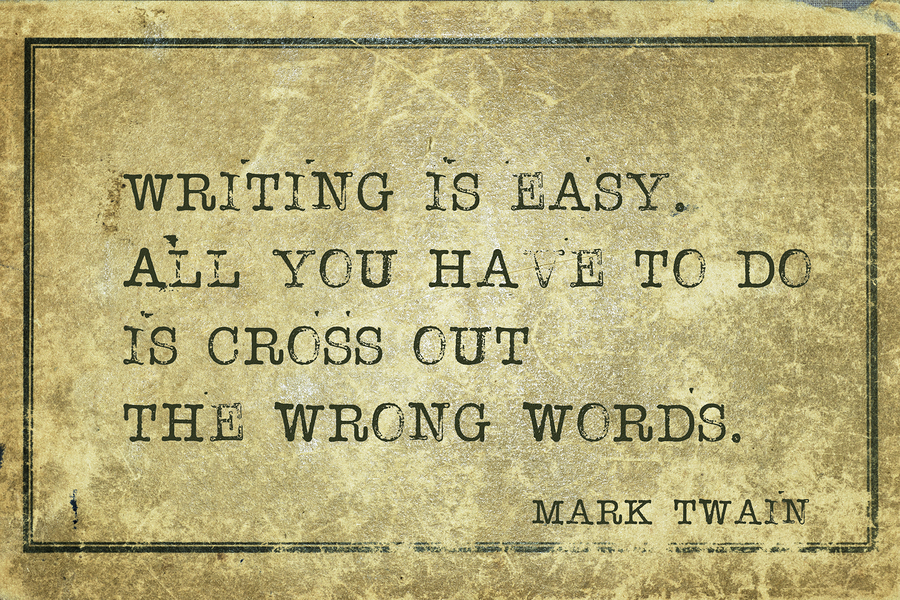Creative people usually don’t like being told what to create or what not to create.
Similarly, explorers and researchers don’t like being told, “Don’t look there,” or “Explore over here.” By nature, they follow their training and instincts from place to place and thought to thought.
As a writer, while the worst thing you could do is plagiarize someone else’ work, the worst thing someone else could do to a writer would be to censor their work.
“How dare you tell me what not to write.”
A Christian writer enters this protective bubble of creativity and their obedient faith might collide with creative freedom like a person walking unexpectedly into a clear glass wall.
The impact is jarring. Papers go flying.
When I attend a conference for writers in the broader publishing market, there are no creative boundaries. Sex, violence, profanity, overt evil behavior and anything else a mind could conceive are thrown about like children playing with sand on a beach.
And those are the discussions among writers of books for middle schoolers.
Most Christian writers would agree their relationship with Jesus Christ applies some standard for their work which would preclude using certain writing approaches. Just as Scripture warns a Christ-follower about the words they speak, everything we do should be subject to a much higher level of scrutiny as we function as ambassadors for the Creator.
Are there books a Christian should not write?
I think the answer is yes.
A book is a major statement. It has a long life. Words found in books might live for a hundred years, or more. Among media, books are elephants, social media posts are mosquitoes.
Still, books are not the ultimate destination for every message. Why?
Because as believers, two foundational truths characterize our faith experience:
- God is in the continual process of molding each Christ-follower to be more like him. It is a slow journey with many twists, turns, peaks, and valleys, but we are all a work-in-progress.
- God is in the continual process of drawing others to him, meaning the person you might paint a certain way today, might be a fellow believer tomorrow, or next year, or fifty years from now.
As an agent, I’ve seen proposals which I don’t think should be published, either by traditional or self-publishing methods. They ignore the two facts I mentioned above and seek to put a stake in the ground on an issue (or through someone else’ heart).
One or more years from now, the underlying story and facts in a book, or the author himself or herself could be entirely different, spiritually or otherwise, making the book irrelevant.
Mostly, I am talking about writing driven by anger or a judgmental spirit. Most books written with a negative undertone will not last long. Those which uplift, reminding others of God’s ongoing work in the world and pointing to the answer to life’s greatest mysteries, are more compelling long-term projects to pursue.
Writing a tell-all about your former church or ex-spouse and how terrible they are? Nope.
Sometimes an agent or publisher declining a proposal is simply saying, “This book will be irrelevant in six months.”
Sure, there are short life-cycle books which might be here today and gone next week and have some value. But copies of the book will live a lot longer, and the person, company or organization you painted in a certain light might come back and haunt you in the future. The author might even regret writing it.
Instead:
–Write big – Topics which explain something deep and long-lasting. Almost never will it involve complaining, anger or personal attacks.
–Leave room for God – Never assume you know the end-game or conclusion for any story. God’s grace is lavish, he never lets his children slip from his grasp or withdraws his love from them. Write like you know this.
Writing as a Christian carries different standards than the rest of the creative world. While many authors point to creative freedom as their standard, Christian authors know true freedom is actually the freedom from sin, bought for a great price and they desire to reflect thankfulness for it through what they write.



 40 Days with One Composition
40 Days with One Composition

Excellent post. Lots to think about. Thank you for writing this piece.
Wonderful post! Great perspective and a much needed look at writing.
I just read a chapter of writing from a young person with the kind of vindictiveness and name bashing you described. The author wanted my opinion. I suggested writing for catharsis and putting the manuscript in the drawer.
Sometimes, we as writers need to write the nasty stuff just to get rid of it. Then we need to set it aside. A later look will reveal what of that writing has merit (I’ve found maybe 5% in my experience) and what needs to be trashed.
Great post, Dan, and so true!
There are some good and worthwhile things that are questionable for publication, too – because, well, who would really understand, and the reading could have the opposite effect to that which was intended.
I’ve been urged to write about my trip to death’s door; I’ve done so on my blog, but that’s a collection of life-snippets, really, with some advice for patients and caregivers that I hope is useful.
But a book? That has to cut to the meaning with the graceful Hail Mary arc of a pass into the end zone, and how can I really say that pancreatic cancer is the best worst thing that’s ever happened to me?
How can I say that the agony (and yes, it is, even as I write) has brightened my days with beauty appreciated for itself, and not for how it makes me feel?
How can I say that life is not a duality of Good Things and Horrible Things, writ boldly on opposite sides of a strip of paper whose ends are joined into a ring? Good outside, Bad inside!
I can’t, because life and death is about cutting the ring, and giving it a half-twist and taping the ends back together.
Now trace your finger over the Good, and suddenly you’ll find you’re seamlessly into the Horrible…and then, if you keep moving, back into the Good again.
You’ve created a Moebius Strip, a two-dimensional object with only one surface, and you can dive through that ring to freedom.
But how can I even begin to say this?
You’ld think me half mad.
God grants us gifts to build up–not tear down–the body of Christ. And we should always ask, “Is this my story to tell?” Many great stories are not mine to tell.
Thanks for the post. I fear the creative envelope might be quite small. My current work is edgy in that my mc drinks bourbon and said hell and damn before his conversion. An agent from Grand Rapids likes my pitch but insisted I rewrite those two pieces. I did not rewrite after considering input from other people.
Blessings to you and yours.
Very wise advice, Dan. At first, Francine Rivers came to mind as an author whose writing changed significantly after becoming a Christian. Your reference to the conference you attended and the topics you listed as middle grade discussions had a shock effect. Wow. I experienced that same shock effect last year in a FB group of authors who debuted in 2017. I didn’t even know some of their genres existed! Your post took a different turn than I expected when you described the two foundational truths. Excellent points.
Well put, Dan. I could not agree more. Writing about the power of love and forgiveness is always my goal, and I could never do that well without God’s help.
Well said. It goes without saying, think before you speak, think before you and as you write!
What a great word! It is a really pointed reminder that our faith follows us all day, every day, not just on Sundays in church. True application for life – thanks.
Excellent post!
Any time we take up a position of authority on something, be it through writing or speaking, we need to take that responsibility very seriously. If we, as Christians, believe what the Bible says, we know that it is a very great wrong to lead our audience astray, even if unintentional.
And when we use our platform to blow off steam or preach with a judgemental heart, we’re really trying to teach before our own lesson has even been learned. If we wait to tell a story until the lesson has been learned and the healing has happened, it will usually be an uplifting tale that others are drawn to. We don’t want to drop our readers or listeners into the depths of a pit with us, before we’ve discovered the way out ourselves!
I couldn’t agree more! Thank you for the reminder.
What a wonderful post. Thank you 🙂
Dan, thank you for your comments. I wonder if writing a character as a negative drunk who becomes saved is something that will last, or writing a character who turns his or her back on God is acceptable, even as others in the book do the opposite. What are your thoughts?
Mostly I am talking about non-fiction writing here. In fiction you must have good and bad to make it interesting!
Thank you for writing this. You have helped me clarify how to approach completing writing the book I have been long procrastinating. I had not been sure how to do it without going into too much personal detail which I felt would ultimately detract from the story, be irrelevant to the reader, and violate my family’s privacy I want to protect. Your encouragement to “write big” and stay away from too much negative are just the affirmation & clarification I needed to know. How to proceed. Thank you!
Dan,
Thank you for a great post. One thing I appreciate that you didn’t say was that Christians should write only in the Christian market. As someone who indie publishes in the general market right now, I’m a Christian writing in the general market. I know it can be a very dark place, this general market, but I’m determined to let the light of Christ shine in it.
I couldn’t agree more! This reminds me of a ‘teaching moment’ I had with my oldest daughter when she was about 8 or 9. She loved to pretend she was an animal and ran around CONSTANTLY (and with amazing coordination) on all fours. She also loved to draw.
One day she brought me a sketch of wolves tearing apart a deer. It was rather–eh–gruesome. I complimented her skills but suggested she could come up with a little more uplifting compositions. She became a bit indignant and insisted that it was *her* artwork and *her* idea and she should be able to draw what she wanted.
I tried to explain that just because we are ABLE to draw or write or sing certain things–just because we have an idea or desire to do it–doesn’t mean we SHOULD. An artist has a responsibility to their audience too, and ultimately to God (not that it was sinful to draw nature as she had). It was a good talk in the end and we did not have an issue with it again.
With my writing, I always consider my main audience to be the Lord and then take it from there 😉
PS. I always enjoy your posts! I’m usually reading on my phone and find it too cumbersome to post a comment from my tiny screen 😀 On my computer today!
As a relatively new subscriber to these blogs, I feel blessed to have discovered an agency that seeks to cultivate and inspire writers from a Christian perspective. Regarding the issue of creative freedom, that is a poor standard indeed, especially in a fallen world. What comes to mind instead is an imagination guided by the Holy Spirit into greater depths of revelation. That is freedom indeed!
Thank you for addressing this topic!
The invisible “no” line. I like it. It makes me feel safe. But I also find it a challenge. Can I write in a way that sparks interest and hold attention without baiting a reader with the things that are on the other side of that invisible “no” line?
I suppose it’s a bit like humor. Anybody can make fun of others or call on potty humor, but to be funny beyond those things requires depth of character and insight into humanity.
Interesting. Thank you Dan.
Great advice. Thank you.
Thanks for a constructive and insightful look at a difficult subject. There are several lines of communication going on right now in writing/authoring/publishing discussing all of the areas we, as Christians, and also anyone with any sort of a moral compass, have to tread navigate carefully.
Thanks Again